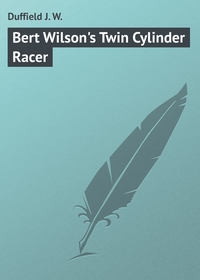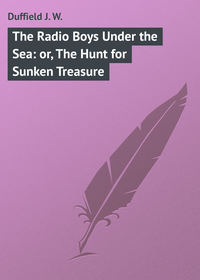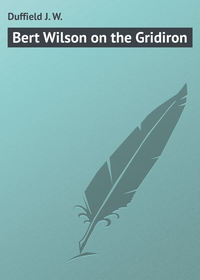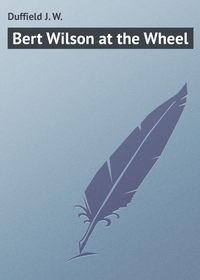 полная версия
полная версияBert Wilson's Fadeaway Ball
“Done much in the pitching line?” he asked carelessly.
“A little,” answered Bert modestly, “only on high school nines though.”
“What have you got in stock?” asked the coach.
“Not much besides the old ‘roundhouse’ curve,” replied Bert. “I don’t think so much of my incurve, though I’m trying to make it break a little more sharply. I can do a little ‘moist’ flinging, too, though I haven’t practised that much.”
“Don’t,” said the coach. “Cut out the spitball. It’s bound to hurt your arm in the long run. Trot out your curve and let’s have a look at it. Easy now,” he said as Bert wound up, “don’t put too much speed in it. You’ll have plenty of chances to do that later on.”
The ball left Bert’s hand with a jerk, and, just before it reached the center of the plate, swept in a sharp, tremendous curve to the outside, so that the catcher just touched it with the end of his fingers.
“Not so bad,” commented the coach carelessly, though his eyes lighted up. “Here, Drake,” he called to a burly veteran who was looking on with interest, “take your wagon tongue and straighten out this youngster’s curves.”
The good-natured giant, thus addressed, picked up his bat and came to the plate.
“Get it over the plate now, kid, and I’ll kill it,” he grinned.
A little flustered by this confidence, Bert sent one in waist high, just cutting the corner. Drake swung at it and missed it by six inches.
“One strike,” laughed the coach, and Drake, looking a little sheepish, set himself for the next.
“Give him a fast one now, shoulder high,” ordered the coach. Again the ball sped toward the plate and Drake struck at it after it had passed him and thudded into the catcher’s glove.
“Gee, I can’t hit them if I can’t see them,” he protested, and the coach chuckled.
“No,” he said, as Bert poised himself for a third pitch, “no more just now. I don’t want you to throw your arm out at practice. There are other days coming, and you won’t complain of lack of work. Come out again to-morrow,” and he walked away indifferently, while his heart was filled with exultation. If he had not unearthed a natural-born pitcher, he knew nothing about ball players.
Drake was more demonstrative. While Bert was putting on his sweater, he came up and clapped him on the shoulder.
“Say, Freshie,” he broke out, “that was a dandy ball you whiffed me with. You certainly had me guessing. If that swift one you curled around my neck had hit me, I would have been seeing stars and hearing the birdies sing. And I nearly broke my back reaching for that curve. You’ve surely got something on the ball.”
“Oh, you’d have got me all right, if I’d kept on,” answered Bert. “That was probably just a fluke, and I was lucky enough to get away with it.”
“Well, you can call it a fluke if you like,” rejoined Drake, “but to me it looked suspiciously like big league pitching. Go to it, my boy, and I’ll root for you to make the team.”
Bert flushed with pleasure at this generous meed of praise, doubly grateful as coming from an upper class man and hero of the college diamond. Dick coming up just then, they said good-by to Drake and started toward their dormitory.
“What’s this I hear about you, Bert?” asked Dick; “you’ve certainly made yourself solid with Ainslee. I accidentally heard him telling one of the assistant coaches that, while of course he couldn’t be sure until he’d tried you out a little more, he thought he’d made a find.”
“One swallow doesn’t make a summer,” answered Bert. “I had Drake buffaloed all right, but I only pitched two balls. He might knock me all over the lot to-morrow.”
“Sufficient unto the day are the hits thereof,” rejoined Dick; “the fact is that he didn’t hit you, and he has the surest eye in college. If he had fouled them, even, it would have been different, but Ainslee said he missed them by a mile. And even at that you weren’t at full speed, as he told you not to cut loose to-day.”
“Well,” said Bert, “if the lightning strikes my way, all right. But now I’ve got to get busy on my ‘Sci’ work, or I’ll surely flunk to-morrow.”
The next day Bert was conscious of sundry curious glances when he went out for practice. News travels fast in a college community and Drake had passed the word that Ainslee had uncovered a “phenom.” But the coach had other views and was in no mood to satisfy their curiosity. He had turned the matter over in his mind the night before and resolved to bring Bert along slowly. To begin with, while delighted at the boy’s showing on the first time out, he realized that this one test was by no means conclusive. He was naturally cautious. He was “from Missouri” and had to be “shown.” A dozen questions had to be answered, and, until they were, he couldn’t reach any definite decision. Did the boy have stamina enough to last a full game? Was that wonderful curve of his under full control? Was his heart in the right place, or, under the tremendous strain of a critical game, would he go to pieces? Above all, was he teachable, willing to acknowledge that he did not “know it all,” and eager to profit by the instruction that would be handed out in the course of the training season? If all these questions could be answered to his satisfaction, he knew that the most important of all his problems – that of the pitcher’s box – was already solved, and that he could devote his attention to the remaining positions on the team.
Pursuing this plan of “hastening slowly,” he cut out all “circus” stunts in this second day’s practice. Bert was instructed to take it easy, and confine himself only to moderately fast straight balls, in order to get the kinks out of his throwing arm. Curves were forbidden until the newness wore off and his arm was better able to stand the strain. The coach had seen too many promising young players ruined in trying to rush the season, and he did not propose to take any such chances with his new find.
His keen eyes sparkled, as from his position behind the pitcher, he noted the mastery that Bert had over the ball. He seemed to be able to put it just where he wished. Whether the coach called for a high or a low ball, straight over the center of the plate or just cutting the corners, the ball obeyed almost as though it were a living thing. Occasionally it swerved a little from the exact “groove” that it was meant to follow, but in the main, as Ainslee afterward confided to his assistant, “the ball was so tame that it ate out of his hand.”
He was far too cautious to say as much to Bert. Of all the dangers that came to budding pitchers, the “swelled head” was the one he most hated and detested.
“Well,” he said as he pretended to suppress a yawn, “your control is fairly good for a beginner. Of course I don’t know how it will be on the curves, but we’ll try them out too before long.”
“That,” he went on warming to his subject, “is the one thing beyond all others you want to work for. No matter how much speed you’ve got or how wide your curve or how sharp your break, it doesn’t amount to much, unless you can put the ball where you want it to go. Of course, you don’t want to put every ball over the plate. You want to make them ‘bite’ at the wide ones. But when you are ‘in the hole,’ when there are two strikes and three balls, the winning pitcher is the one that nine times out of ten can cut the plate, and do it so surely that the umpire will have no chance to call it a ball. One of the greatest pitchers I ever knew was called the ‘Curveless Wonder.’ He didn’t have either an incurve or an outcurve that was worth mentioning. But he had terrific speed, and such absolute ability to put the ball just where he wanted it, that for years he stood right among the headliners in the major leagues. Take my word for it, Wilson, a pitcher without control is like the play of Hamlet with Hamlet left out. Don’t forget that.”
The respect with which Bert listened was deepened by his knowledge that Ainslee was himself famous, the country over, in this same matter of control. A few more comments on minor points, and the coach walked away to watch the practice of his infield candidates.
Now that Pendleton had graduated, the logical successor of the great first baseman seemed to be Dick Trent, who had held the same position on the scrubs the year before, and who had pressed Pendleton hard for the place. The first base tradition demands that it be occupied by a heavy batter, and there was no doubt that in this particular Dick filled the bill. His average had been well above the magic .300 figures that all players covet, and now that he had conquered his propensity to excessive swinging, he might fairly be expected to better these figures this year. As a fielder, he was a sure catch on thrown balls either to right or left, and his height and reach were a safe guarantee that not many wild ones would get by him. He was lightning quick on double plays, and always kept his head, even in the most exciting moments of the game. If he had any weakness, it was, perhaps, that he did not cover quite as deep a field as Pendleton used to, but that was something that careful coaching could correct. None of the other candidates seemed at all above the average, and, while yet keeping an open mind, the coach mentally slated Dick for the initial bag.
Second and short, as he said to himself with a sigh of relief, were practically provided for. Sterling at the keystone bag and White at shortfield were among the brightest stars of the college diamond, and together with Barry and Pendleton had formed the famous “stonewall” infield that last year had turned so many sizzling hits to outs.
Barry – ah, there was a player! A perfect terror on hard hit balls, a fielder of bunts that he had never seen excelled, even among professional players. He remembered the screeching liner that he had leaped into the air and pulled down with one hand, shooting it down to first for a double play in the last game of the season. It had broken up a batting rally and saved the game when it seemed lost beyond redemption.
Well, there were as good fish in the sea as ever were caught, and no man was so good but what another just as good could be found to take his place. But where to find him? There was the rub. That cub trying out now at third – what was his name? – he consulted the list in his hand – oh, yes, Henderson – he rather fancied his style. He certainly handled himself like a ball player. But there – you never could tell. He might simply be another “false alarm.”
At this moment the batter sent a scorching grounder toward third, but a little to the left of the base. Tom flung himself toward it, knocked it down with his left hand, picked it up with the right and scarcely waiting to get “set” shot it like a flash to first. The coach gasped at the scintillating play, and White called out:
“Classy stuff, kid, classy stuff. That one certainly had whiskers on it.”
“Hey, there, Henderson,” yelled the coach, “go easy there. Float them down. Do you want to kill your arm with that kind of throwing?”
But to himself he said: “By George, what a ‘whip’ that fellow’s got. That ball didn’t rise three inches on the way to first. And it went into Drake knee high. That youngster will certainly bear watching.”
And watch him he did with the eye of a hawk, not only that afternoon, but for several weeks thereafter until the hope became a certainty that he had found a worthy successor to the redoubtable Barry, and his infield would be as much of a “stonewall” that season as the year before. With Hodge in right, Flynn in center and Drake in left, his outfield left nothing to be desired, either from a fielding or batting point of view, and he could now devote himself entirely to the development of his batteries.
Under his masterly coaching, Bert advanced with great rapidity. He had never imagined that there was so much in the game. He learned from this past-master in the art how to keep the batter “hugging first”; the surest way of handling bunts; the quick return of the ball for the third strike before the unsuspecting batter can get “set,” and a dozen other features of “inside stuff” that in a close game might easily turn the scale. Ainslee himself often toed the plate and told Bert to send in the best he had. His arm had attained its full strength, under systematic training, and he was allowed to use his curves, his drop, his rise ball and the swift, straight one that, as Flynn once said, “looked as big as a balloon when it left his hand, but the size of a pea when it crossed the plate.”
One afternoon, when Ainslee had taken a hand in the batting practice, Bert fed him an outcurve, and the coach smashed it to the back fence. A straight high one that followed it met with no better fate. It was evident that Ainslee had his “batting eye” with him that afternoon, and could not be easily fooled.
“Send in the next,” he taunted, good-naturedly, “I don’t think you can outguess me to-day.”
A little nettled at his discomfiture, Bert wound up slowly. For some time past he had been quietly trying out a new delivery that he had stumbled upon almost by accident. He called it his “freak” ball. He had thrown it one day to Dick, when, after the regular practice, they were lazily tossing the ball to and fro. It had come in way below where Dick’s hands were waiting for it, and the latter was startled. It was a “lulu,” he said emphatically. It could not be classed with any of the regulation curves. Bert had kept it under cover until he could get perfect control of it. Now he had got it to the point where he could put it just where he wanted it, and as he looked at the smiling face of the coach he resolved to “uncork” it.
He took a long swing and let it go. It came to the plate like a bullet, hesitated, slowed, then dropped down and in, a foot below the wild lunge that the coach made for it. His eyes bulged, and he almost dropped the bat.
“What was that?” he asked. “How did you do it? Put over another one.”
A second one proved just as puzzling, and the coach, throwing his bat aside, came down to the pitcher’s box. He was clearly excited.
“Now, what was it?” he asked; “it wasn’t an incurve, a drop, or a straight, but a sort of combination of them all. It was a new one on me. How do you hold your hand when you throw it?”
“Why,” replied Bert, “when I throw it, the palm is held toward the ground instead of toward the sky, as it is when I pitch an outcurve. The wrist is turned over and the hand held down with the thumb toward the body, so that when the ball slips off the thumb with a twisting motion it curves in toward the batter. I grip it in the same way as an outcurve. Just as it twists off the thumb I give it a sharp snap of the wrist. It spins up to the plate, goes dead, then curves sharply down and in.”
“Well,” said the coach, “it’s certainly a dandy. We must develop it thoroughly, but we’ll do it on the quiet. I rather think we’ll have a surprise for ‘our friends the enemy,’ when the race begins. It’s just as well to have an ace up our sleeve. That ball is in a class by itself. It just seems to melt while you are trying to locate it. If I were to give it a name at all, I’d call it a ‘fadeaway.’”
And so Bert’s new delivery was christened. As they walked back to the college both were exultant. They would have been still more so, if at that moment they had begun to realize the havoc and dismay that would be spread among their opponents before the season ended by Bert’s fadeaway ball.
CHAPTER III
The “Inside” Game
“Well, Tom, I see that you lead off in the batting order,” said Bert, as they sat in his rooms at the close of the day’s work.
“Yes,” said Tom, “Ainslee seems to think that I am a good waiter, as well as a pretty fair sprinter, and I suppose that is the reason he selected me.”
“‘They also serve who only stand and wait,’” recited Dick, who was always ready with an apt quotation.
“Well,” laughed Bert, “I don’t suppose the poet ever dreamed of that application, but, all the same, it is one of the most important things in the game to lead off with a man who has nerve and sense enough to wait. In the first place, the pitcher is apt to be a little wild at the start and finds it hard to locate the plate. I know it’s an awful temptation to swing at a good one, if it is sandwiched in between a couple of wild ones, and, of course, you always stand the chance of being called out on strikes. But at that stage of the game he is more likely to put over four balls than three strikes, and if you do trot down to first, you’ve got three chances of reaching home. A sacrifice will take you down to second, and then with only one man out and two good batters coming up, a single to the outfield brings you home.”
“Then, too, you went around the bases in fifteen seconds flat, the other day,” said Dick, “and that’s some running. I noticed Ainslee timing you with his split-second watch, and when he put it back in his pocket he was smiling to himself.”
“Flynn comes second, I see,” said Bert, consulting his list, “and that’s a good thing too. He is one of the best ‘place’ hitters on the team. He has the faculty that made Billy Keeler famous, of ‘hitting them where they ain’t.’ He’s a dandy too at laying down a bunt, just along the third-base line. If any man can advance you to second, Flynn can.”
“Yes,” said Tom, “with Drake up next, swinging that old wagon tongue of his, and then Dick coming on as a clean-up hitter, it will have to be pretty nifty pitching that will keep us from denting the home plate.”
“Last year the team had a general batting average of .267,” chimed in Dick. “If we can match that this year, I guess there’ll be no complaint. As a matter of fact, however, I’m a little dubious of doing that, especially with old Pendleton off the team. But if we come short a little there, I am counting on Bert holding down the batters on the other nines enough to make up for it.”
“If I get a chance, I’ll do my very best,” said Bert, “but perhaps I won’t pitch in a regular game all season. You know how it is with a Freshman. He may have to sit on the bench all the time, while the upper class pitchers take their turn in the box. They’ve won their spurs and I haven’t. They’ve ‘stood the gaff’ under the strain of exciting games, and pulled victories out of the fire. I might do it too, but nobody knows that, and I probably would not be called on to go in the box, except as a last resort. They may believe that I have the curve, but they are not at all sure that I have the nerve. Winters and Benson are going along now like a house afire, and if they are at top speed when the season begins I’ll see the pennant won or lost from my seat on the bench.”
“Neither one of them has anything on you,” maintained Tom stoutly. “Of course they are, in a certain sense, veterans, and then, too, they have the advantage of having faced before many of the players on the other teams. That counts for a lot, but you must remember that Hinsdale has caught for the last two years, and he knows these things as well as the pitchers. He knows their weak and their strong points, the ones that simply kill a low outcurve, but are as helpless as babies before a high fast one. He could quickly put you on to the batters’ weakness. But outside of that you’ve got them faded. You have more speed than Winters and more endurance than Benson. Neither one of them has a license to beat you at any stage of the pitching game.”
“Perhaps it’s your friendship rather than your judgment that’s talking now, Tom,” smiled Bert.
“No,” said Dick, “it isn’t. Tom’s right. You’ve got everything that they have, and then some. Winters’ rise ball is certainly a peach, but it hasn’t the quick jump yours has just before it gets to the plate. My eye isn’t so bad, but in practice I bat under it every time. Even when I don’t miss it altogether, I hit it on the underside and raise a fly to the fielders. It’s almost impossible to line it out. And your fast high one is so speedy that a fellow backs away from the plate when he sees it coming. I don’t know that your outcurve is any better than Benson’s, but you certainly have it under better control.”
“On the dead quiet,” he went on, “I’m rather worried about Winters this year, anyway. I think he’s gone back. He’s in with a fast bunch, and I fear has been going the pace. His fine work in the box last year made him a star and turned his head. It brought him a lot of popularity, and I’m afraid he isn’t the kind that can stand prosperity. He doesn’t go at his work in the right spirit this year. You all saw how he shirked the other day when we were training for wind.”
They readily recalled the incident to which Dick alluded. The practice had been strenuous that day, but the coach had been insistent. As a wind up, he had called for a run around the track to perfect their wind and endurance, as well as to get off some of the superfluous flesh that still interfered with their development. The players were tired, but, as the trainer didn’t ask them to do what he was unwilling to do himself, they lined up without protest and trotted behind him around the track.
At one place, there was a break in the fence which had not yet been repaired. Twice they made the circuit of the track, and some of them were blowing hard, when the relentless leader started on the third round. As they came abreast of the break, Winters, with a wink, slipped out of the line and got behind the fence. Here he stayed, resting, while the others jogged along. They made two circuits more, and when they came to where he was, Winters, fresh as a daisy, and grinning broadly, slipped into line again, and trotted along as though nothing had happened. The joke seemed certainly on the coach, who hadn’t once turned his head, but pounded steadily along, in apparent unconsciousness that one of his sheep had not been following his leader. At the bench, after the sixth round, he slowed up.
“Good work, boys,” he said pleasantly, “that makes six full laps for all of us except Winters. We’ll wait here, while he takes his other two.”
The grin faded from Winters’ face, to be replaced by a hot flush, as his eyes fell before the steady look of the coach. There was no help for it, however. He had been caught “red-handed,” and with a sheepish glance at his laughing comrades, he started on his lonely run around the course while they stood and watched him. Twice he made the circuit and then rejoined his companions. The coach said nothing more, as he felt that the culprit had been punished enough, but the story was too good to keep, and Winters was “joshed” unmercifully by his mates. The incident deepened the general respect felt for the coach, and confirmed the conviction that it was useless to try to fool him, as he had “eyes in the back of his head.”
He certainly needed all his keenness, in order to accomplish the task he had set himself. The time was wearing away rapidly, and before long he would have to rejoin his own team for the championship season. There had been a good deal of rain, and practice in the field had been impossible for days at a time.
To be sure he had the “cage” for use in rainy weather. This was a large rectangular enclosure, perhaps twice as long as the distance from the pitcher’s box to home plate. The sides were made of rope that stopped the batted balls. There was ample room for battery work, and here, in bad weather, the pitchers and catchers toiled unceasingly, while the other players cultivated their batting eye, and kept their arms limber by tossing the ball about. But, at best, it was a makeshift, and did not compare for a moment with work in the open air on the actual diamond. And the days that now remained for that were distressingly few.
So he drove them on without mercy. No galley slaves worked harder than these college boys for their temporary master. He was bound that not an ounce of superfluous flesh should remain on their bones at the beginning of the season. Gradually his work began to tell. The soreness and lameness of the first days disappeared. Arnica and witch hazel were no longer at a premium. The waistbands went in and the chests stood out. Their eyes grew bright, their features bronzed, their muscles toughened, and before long they were like a string of greyhounds tugging at the leash.
He noted the change with satisfaction. Superb physical condition was the first essential of a winning team. His problem, however, was far from solved. It was only changed. He had made them athletes. Now he must make them ball players.
Individually they were that already, in the purely mechanical features of the game. They were quick fielders, speedy runners and heavy batters. But they might be all these, and yet not be a winning team. They needed team work, the deft fitting in of each part with every other, the quick thinking that, in a fraction of a second, might change defeat to victory.








